Star Trek’s Brave (But Ultimately Safe) Take on Gay Rights
by Rob Heyman for TrekCore.com
![]()
In these post-Will & Grace, post-DOMA times in which we live, gay characters and storylines in film and television seem as common today as butter on hot morning toast. It’s easy to forget there was a time when trying to get LGBT issues represented in popular media was as futile as, well, trying to cut that same morning toast with a wet noodle.
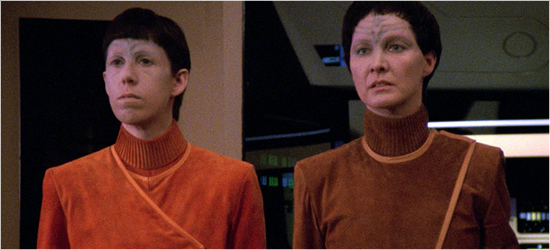
In 1992, Star Trek: The Next Generation took a stab at the issue of gay rights with its fifth-season episode “The Outcast”. It was seen as a bold move for the show. While the early 1990s did offer some limited visibility to gay issues in film and television, most of the stories concerned the gay plight or the struggles of homosexuals within the AIDS epidemic. What made “The Outcast” different is that instead of framing the story around disease or the tragic consequences of an aberrant lifestyle, it took a more sympathetic approach by focusing on fitting-in and assimilation into a hostile culture.
It must be said that the episode does not feature a gay character, nor does it even mention homosexuality. The issue is handled obliquely using a character named Soren, who is a member of an alien race called the J’naii. As an androgynous people, they show no gender identification. Every so often, a child is born that identifies with one particular gender. Because gender identification is considered a sickness in their society, the child – once recognized – must undergo treatment to make the child normal.
In the episode, Soren has hidden her identification with being female from her people for much of her life, but when she falls in love with Riker, the secret is exposed. She is forced to undergo treatment at the end of episode and is ostensibly cured of her identification.
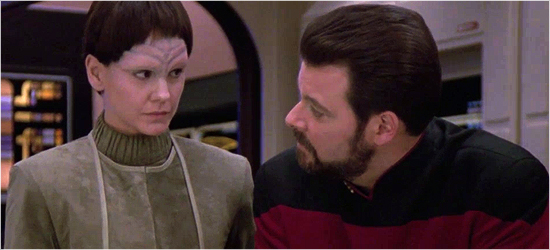
For many fans of the show, “The Outcast” failed to deliver on its promise of a gay-rights episode. There was no coming-out for a member of the crew. There was no new character on the ship who was introduced as gay. It felt like a cop-out: a way of addressing the issue in a quick, one-hour installment with an alien race that no one really cared about or would care about next week when the crew was dealing with an altogether new crisis. What’s more, the alien lead was noticeably female in appearance and voice (a female actor did play the part), which kept the dynamic between her and Riker comfortably heterosexual. For what was to be a bold, water-cooler episode, it felt far too safe and conventional for its ambitions.
The Next Generation would not have been risking much had it chose to produce a far more overt gay-rights episode. The show was already monstrously successful by the end of its fifth season. The series had already broken significant ground in the past with its first interracial kiss. Fans had come to expect a bit of the unorthodox from Star Trek. It is likely that a carefully presented gay character for the show would not have damaged its already swelling popularity. It is also very likely it would have generated even more buzz for an aging show that was facing growing competition from newer sci-fi television series.
Of course, when you open this particular door as a producer, you are then forced to commit to regular storylines to justify the choice. With its end-run squarely on the horizon, it’s possible the producers didn’t want to paint themselves into a corner this late in the game. Still, there were far more effective choices the producers could have made to make this a more palatable gay-issues episode.
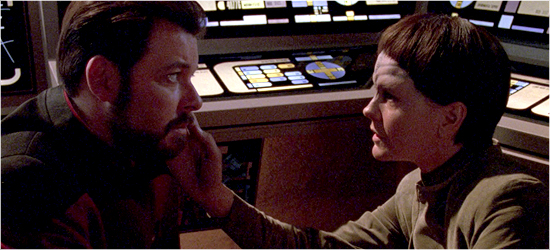
First, the producers should not have chosen Riker to be Soren’s love interest. The relationship just isn’t believable. There’s nothing to suggest from Riker’s past (or from what we’ve seen over the course of five seasons) that this would be the type of person Riker would be attracted to. Riker has been largely characterized as a skirt-chaser attracted to beautiful women. As an androgynous female wrestling with complex personal issues, Soren is the complete opposite of what he usually finds appealing.
It is possible Riker was chosen to give him some character development, but the long-term implications of his attraction are never explored. It also does the character tremendous disservice to have him violate the Prime Directive in an attempt to save Soren. At this point in his service aboard the Enterprise (and in the series), this action is completely reprehensible and just plain unbelievable.
A more logical choice for the part would have been Barclay, a popular milquetoast crewman. This would have provided the producers more freedom to explore a so-called gay-themed episode in less oblique terms. Barclay is an infrequent regular on the show. He is intelligent, open-minded, and is often entrusted with assignments that put him in close contact with senior staff. It would have been completely credible to have assigned him to Soren’s mission.
Although Barclay has been portrayed as heterosexual, there’s nothing to suggest that he couldn’t be attracted to a man. Since Barclay craves companionship of any kind in his life, a case could be made for some flexibility in his sexuality, which opens the door perfectly for a male Soren. It would have provided a wonderful way to address gay issues and, at the same time, enrich Barclay’s character with some development. What’s more, the producers wouldn’t be forced into more storylines on the subject because Barclay isn’t a regular to begin with.
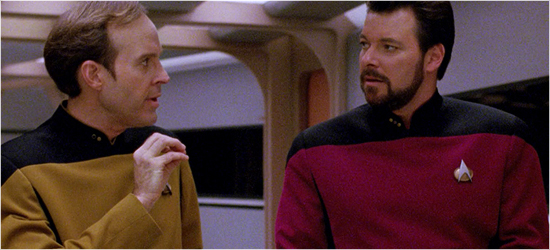
A lot of criticism has been directed at having Soren undergo reparative therapy at the conclusion of episode. Was it another way for the producers to quickly flush the storyline so Riker could remain single and available? Probably. Again, using Riker painted the producers into a difficult creative corner. I never saw the ending as endorsement for reparative therapy or an attempt to make the case that gays would be happier if they were normal, as Soren appears to be at the end of the episode. This is a tragic story with a tragic ending, and that’s how I saw it. Just because she’s different — or, for our purposes here, gay — doesn’t mean she’s necessarily entitled to a happy ending.
At the end of the day, Star Trek is about our main characters and their growth and journey. The episode “The Inner Light” is a terrific example of using a risky character story to properly evolve a character. As soon as Picard awoke from his experiences in that episode, he didn’t simply brush off the dirt and go about his merry way. His experiences on the planet, particular with the flute, helped inform his actions later on. He changed. There’s nothing to suggest Riker changed as a result of his experiences with Soren.
“The Outcast” is indicative of a lot of the problems the producers were having with Riker’s character post-third season. Up until the Borg finale in season three, Riker was portrayed largely as alpha-male functioning as a rather impulsive counter-point to the more professorial Picard. He wasn’t someone you wanted to piss off. After passing on his own command in “The Best of Both Worlds” (a decision that ultimately saved his life), it seemed the stage was set to start making Riker look more and more weak and uncertain. It is hard to swallow that someone who essentially destroyed the Borg and saved Earth would continue to remain a first officer.
I would think Starfleet would have forced the promotion to captain, as I’m sure they were in need of good leaders given the ongoing struggles with the Cardassians in particular. No other character has been bullied around by other officers in Starfleet more than Riker it seems. Despite his incredible achievements with the Enterprise, he was treated like a kid struggling to get respect from all adults in the room. It’s ironic that Riker had been given some of the more interesting episodes in the latter seasons. “The Pegasus” is a wonderful episode that offers some nice backstory for Riker. “Second Chances” introduces us to Tom Riker, a twin created from a transporter mishap. “Lower Decks” nicely reminds us of the ‘old’ Riker with his bad-ass attitude. All good episodes, but wildly inconsistent.
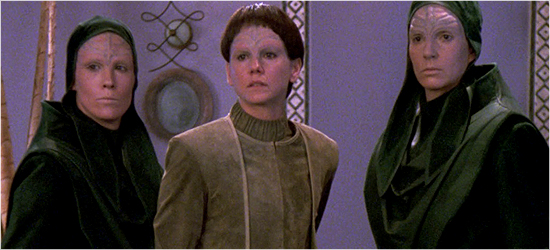
For all its flaws, “The Outcast” should not be dismissed. It did get people talking and it raised some awareness of gay issues at a time when there wasn’t much discussion. With all the advances the LGBT community has made in the past 10 years, especially in television and film, “The Outcast” seems rather quaint as an issues show today. The moral and ethic debate waged in this episode, however, remains as relevant as it did in 1992.
Reparation therapy continues to attract media attention, and many people do struggle with issues of gender identity — and perhaps that is what Star Trek has always done best. It may not always provide easy answers to difficult issues but it does open the floor to begin discussion.
